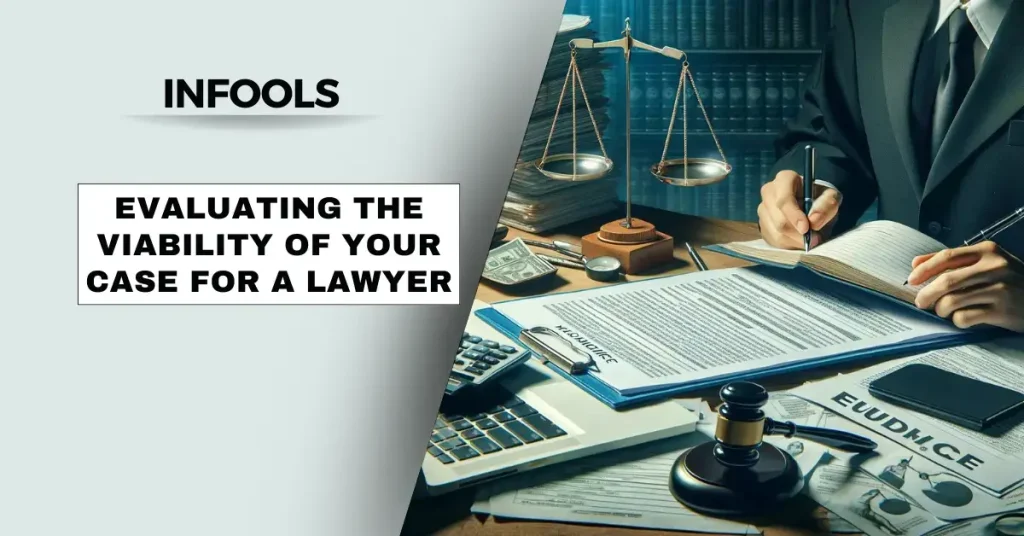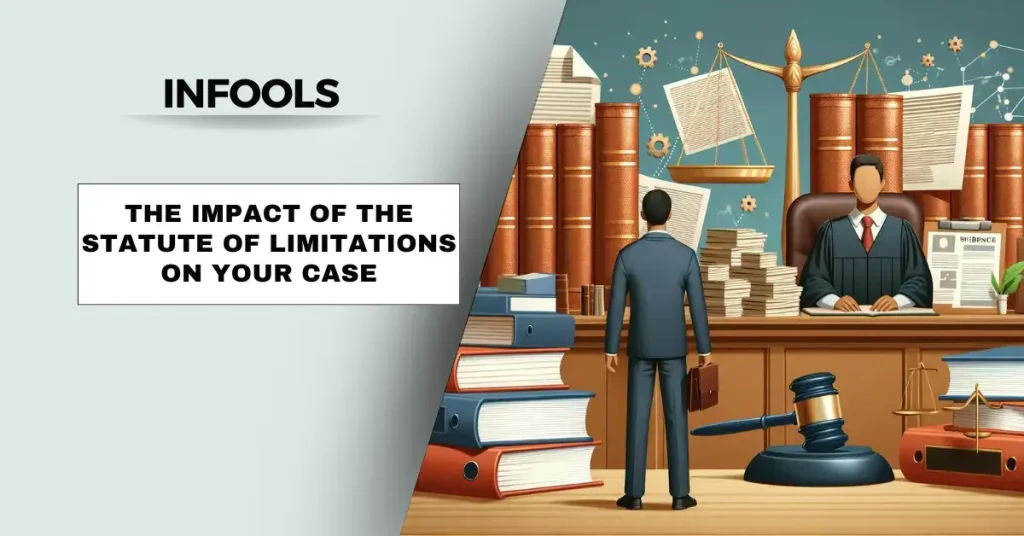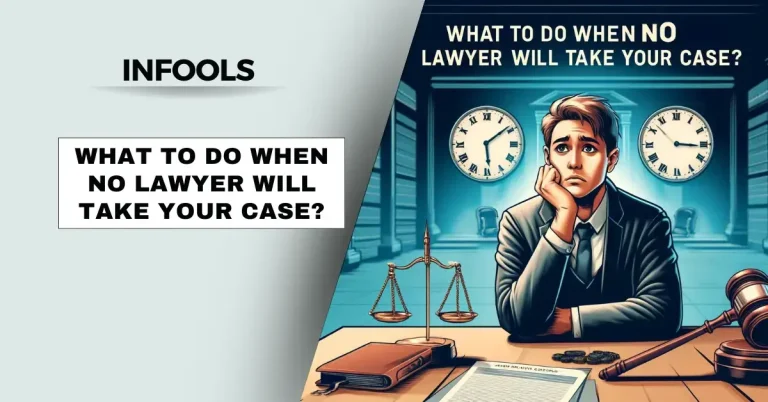What to do when no lawyer will take your case? This question can be daunting, especially when you need legal assistance after an injury or accident. When no lawyer will take your case, you may feel frustrated and unsure of how to proceed.
This situation often arises due to reasons like low financial potential, insufficient evidence, or high risk of losing. Understanding these factors and knowing your options can help you navigate this challenging scenario.
This guide will explain why attorneys might refuse your case and provide strategies to improve your chances of finding legal representation.
KEY POINTS
- Lawyers often decline cases with low financial potential, insufficient evidence, or a high risk of losing.
- Strengthening your case with strong evidence and clear liability improves your chances of securing representation.
- Understand and act within the statute of limitations to avoid losing your right to seek compensation.
- Consider alternative legal resources, such as legal aid organizations, if you can’t find a lawyer.
- Initial free consultations with lawyers can provide valuable case evaluations and legal advice.
Table of Contents
Why Lawyers Might Hesitate to Accept Your Case
Common Reasons for Refusal
Lawyers and attorneys often refuse cases for several reasons, and understanding these can help you better navigate your situation.
Low Potential for Recovery
One major reason a lawyer might not take your case is the perceived low potential for financial recovery. Attorneys often work on a contingency fee basis, meaning they only get paid if you win your case or settle.
If your case doesn’t promise a substantial recovery, a lawyer might not see it as worth the risk. The costs associated with pursuing a case, such as court fees, expert witness fees, and other litigation expenses, often exceed the potential recovery, making it financially unviable for the law firm.
Insufficient Evidence
Another common reason is the lack of sufficient evidence to support your claim. Lawyers need to prove negligence or fault to win a personal injury case. If the evidence is weak or inconclusive, attorneys may be reluctant to invest time and resources into a case that seems likely to fail.
This can include unclear accident reports, lack of medical documentation, or unreliable witness testimonies. Without strong evidence, proving liability and securing a favorable outcome becomes challenging.
High Risk of Losing
The perceived risk of losing the case can also deter lawyers. Some cases are inherently more difficult to win due to legal complexities or the nature of the defendant, such as a well-funded insurance company or a powerful corporate entity.
Lawyers may assess the likelihood of success and decide that the odds are too low to justify taking the case. Additionally, if the case involves novel legal issues or untested areas of law, attorneys might be hesitant to take it on without clear precedent to rely upon.
Evaluating the Viability of Your Case for a Lawyer
Importance of Case Potential and Cost-Benefit Analysis
When assessing whether to take your case, lawyers conduct a detailed cost-benefit analysis to determine its viability. Understanding this process can help you present a stronger case and improve your chances of securing representation.
Assessing Financial Potential
Lawyers evaluate the potential financial recovery from your case compared to the costs involved. They consider the severity of your injury, the impact on your life, and the extent of the damages you’re seeking.
Cases with significant injuries and substantial damages are more attractive because they promise higher compensation. For example, a car accident resulting in permanent disability might offer higher recovery potential than a minor slip and fall with no lasting effects.
Evidence and Legal Strength
The strength of the evidence and the clarity of legal issues also play a crucial role in evaluating case viability. Lawyers look for clear, convincing evidence that can prove fault and negligence. This includes medical records, accident reports, eyewitness accounts, and expert testimonies.
Cases with strong, well-documented evidence are more likely to succeed and, therefore, more appealing to attorneys. They also consider any legal precedents or similar cases that can support your claim, making it easier to argue in court.
Complexity and Risk Assessment
The complexity and risks associated with your case are additional factors lawyers consider. Cases involving complicated legal issues, multiple parties, or high-profile defendants can be more challenging and time-consuming.
Attorneys assess the likelihood of success and weigh it against the potential risks and costs. High-risk cases with uncertain outcomes may not be worth the investment, especially if the chances of winning are low.
Lawyers prefer cases with clear liability and a high probability of success to maximize their efforts’ return.

The Role of Contingency in Lawyer Decisions
Understanding Contingency Fees
Contingency fees are a common arrangement in personal injury cases. Lawyers work without upfront payment and only receive a percentage of the settlement if the case is won.
This arrangement reduces the financial burden on clients but also makes attorneys selective about the cases they take. They prefer cases with a high likelihood of success and significant compensation potential.
Implications for Case Acceptance
When considering a case on contingency, lawyers assess the potential recovery amount. They estimate the value of your claim based on the severity of your injuries, medical expenses, lost wages, and other damages.
If the expected recovery is low, lawyers might not take the case because their potential earnings won’t justify the investment of time and resources.
Risk and Investment
Contingency cases involve significant risk for lawyers. They invest their own money in case-related expenses, including filing fees, expert witnesses, and investigation costs. If they lose the case, they recover nothing.
This risk assessment influences their decision. Cases with strong evidence, clear liability, and high damage potential are more appealing because they offer a higher chance of a favorable outcome.
What To Do When No Lawyer Will Take Your Case?
1. Seek Alternative Legal Resources
If you can’t find a lawyer to take your case, consider other legal resources. Legal aid organizations provide free or low-cost services to those who can’t afford private attorneys.
They often handle cases involving personal injury, family law, and other areas. While they may have limited resources, they can offer valuable assistance.
Self-Representation
In some cases, you might consider representing yourself. This approach requires thorough preparation and understanding of legal procedures.
Resources such as self-help legal guides and online legal forums can provide guidance. However, self-representation is challenging and not advisable for complex cases.
2. Appeal to Different Law Firms
If several lawyers have declined your case, try contacting different law firms. Firms specializing in specific types of personal injury cases may have more experience and resources to handle challenging cases.
Explain your situation clearly and provide all relevant documentation to help them assess your case’s viability.
Get a Second Opinion
If one lawyer declines your case, it doesn’t mean another won’t accept it. Seek a second opinion from another attorney. Different lawyers may have different perspectives and strategies. They might see potential in your case that the first lawyer missed.
3. Strengthen Your Case
Improving the strength of your case can make it more appealing to lawyers. Gather as much evidence as possible, including medical records, accident reports, and witness statements. Demonstrating clear liability and the extent of your injuries can increase the likelihood of finding representation.
Documentation and Evidence
Thorough documentation is crucial. Organize your medical records, bills, and any communication related to the incident. Photographs of injuries, accident scenes, and damaged property can also support your case. The more evidence you have, the stronger your case will be.
Professional Support
Consider hiring a private investigator or expert witness to gather additional evidence or provide testimony.
These professionals can strengthen your case by offering objective, detailed information that supports your claims. While this involves additional costs, it can improve your chances of finding a lawyer.
How to Strengthen Your Case for Better Legal Attraction
1. Gathering Strong Evidence
Strong evidence is crucial for making your case appealing to lawyers. This includes medical records, accident reports, and eyewitness testimonies.
Medical Documentation
Ensure you have comprehensive medical records detailing your injuries. This should include diagnoses, treatments, and any ongoing medical needs. Documentation from doctors and other healthcare providers helps establish the extent and impact of your injuries.
Accident Reports and Witness Statements
Accident reports from law enforcement or other official entities provide an objective account of the incident. Collect witness statements from anyone who saw the accident or its aftermath. These can corroborate your version of events and strengthen your case.
2. Demonstrating Liability
Proving that another party is at fault is essential. This involves showing that their negligence caused your injuries.
Clear Proof of Negligence
Gather evidence that demonstrates the other party’s negligence. This can include photos of the accident scene, video footage, or any other documentation that shows how the incident occurred. Highlight any violations of laws or regulations by the other party.
Expert Testimonies
Consider hiring experts who can testify on your behalf. For instance, an accident reconstruction expert can provide insights into how the accident happened. Medical experts can discuss the severity and impact of your injuries. Their testimonies can provide crucial support for your claims.
3. Presenting a Clear and Compelling Case
Organizing your case information clearly can make it easier for a lawyer to understand and assess its potential.
Organized Documentation
Keep all your documents organized and easily accessible. This includes medical records, accident reports, witness statements, and any other relevant evidence. An organized presentation can help a lawyer quickly understand the strengths of your case.
Detailed Case Narrative
Prepare a detailed narrative of your case. Explain how the accident happened, the injuries you sustained, and the impact on your life. Include details about medical treatments, lost wages, and other damages. A compelling narrative can make your case more relatable and urgent.
The Impact of the Statute of Limitations on Your Case
1. Understanding Statute of Limitations
The statute of limitations sets a deadline for filing a lawsuit. Missing this deadline can bar you from seeking legal recourse.
Time Limits
Each type of legal claim has a specific statute of limitations. For personal injury cases, this period typically ranges from one to three years, depending on the jurisdiction. It’s crucial to know the specific time limit for your case to ensure you file within the allowed period.
Consequences of Missing the Deadline
If you miss the statute of limitations, your case will likely be dismissed. This means you lose the right to seek compensation for your injuries. Lawyers are less likely to take a case if the deadline is close or has passed, as the chances of success diminish significantly.
2. Steps to Take
To avoid issues with the statute of limitations, take prompt action after an accident.
Immediate Legal Consultation
Consult a lawyer as soon as possible after your accident. This allows sufficient time to gather evidence, build your case, and file the lawsuit before the deadline. Early consultation can also help identify any legal complexities that might affect your case.
Keeping Track of Deadlines
Be aware of all relevant deadlines and keep track of them. If your case involves multiple claims or jurisdictions, different statutes of limitations might apply. Ensure you understand all applicable deadlines and work with your lawyer to meet them.
By gathering strong evidence, demonstrating clear liability, and understanding the statute of limitations, you can strengthen your case and improve your chances of finding legal representation. Taking these steps ensures your case is well-prepared and appealing to potential attorneys.

Read More: How To Sue A Hospital Without A Lawyer? Medical Malpractice Case 2024
Understanding the Importance of Fault and Proof in Legal Representation
Role of Fault Determination
Determining fault is crucial in personal injury cases. Lawyers need to establish who is legally responsible for your injuries.
Proving Negligence
To prove fault, lawyers must show that the other party was negligent. This involves demonstrating that the other party failed to act with reasonable care, leading to your injury. Evidence such as accident reports, witness statements, and expert testimony can support this claim.
Comparative and Contributory Negligence
Different jurisdictions follow different rules for determining fault. In comparative negligence systems, fault is distributed among all parties involved.
Even if you are partially at fault, you can still recover damages, but they will be reduced by your percentage of fault. In contributory negligence systems, if you are found even slightly at fault, you may be barred from recovering any damages.
Importance of Strong Evidence
Strong evidence is essential to prove fault and build a compelling case.
Gathering and Presenting Evidence
Collect all relevant evidence, including photos, videos, medical records, and eyewitness accounts. Presenting this evidence clearly and convincingly can strengthen your case. The more concrete the evidence, the easier it is to prove fault and secure a favorable outcome.
Expert Testimony
Expert witnesses can provide valuable insights and support your claims. Medical experts can discuss the extent of your injuries, while accident reconstruction specialists can explain how the incident occurred. Their professional opinions can be pivotal in proving fault and winning your case.
Navigating Accident Claims When Lawyers Refuse Your Case
Handling Accident Claims Independently
If you cannot find a lawyer to take your case, you may need to handle your accident claim on your own.
Filing a Claim with Insurance
Contact your insurance company to file a claim. Provide all necessary documentation, including accident reports, medical records, and any other evidence of your injuries and damages. Insurance companies have their own processes for evaluating and settling claims.
Negotiating a Settlement
Be prepared to negotiate with the insurance company. They may offer a lower settlement than you deserve. Present your evidence and make a strong case for higher compensation. Keep track of all communication and document any settlement offers.
Seeking Alternative Legal Help
If traditional law firms refuse your case, look for other legal help resources.
Legal Aid and Non-Profit Organizations
Legal aid organizations and non-profits often provide free or low-cost legal services. They can help you understand your rights, file claims, and even represent you in some cases. These organizations may have limited resources but can still provide valuable support.
Small Claims Court
For smaller claims, consider taking your case to small claims court. The process is simpler, and you do not need a lawyer to represent you. This option is suitable for cases with lower financial stakes but still allows you to seek compensation for your injuries and damages.
The Significance of Initial Free Consultations
What to Expect
Initial consultations with lawyers are often free and provide a chance to discuss your case.
Case Evaluation
During the free consultation, the lawyer will evaluate the details of your case. They will ask about the incident, your injuries, and any evidence you have. This helps them assess the viability of your case and decide whether to take it on.
Legal Advice
The lawyer will also provide preliminary legal advice. They might suggest additional steps you can take to strengthen your case or point out any weaknesses. This advice can help you understand your legal options and prepare for the next steps.
Preparing for the Consultation
Being well-prepared can make your consultation more productive.
Gathering Documentation
Bring all relevant documents to the consultation. This includes medical records, accident reports, photographs, and any other evidence related to your case. Having these documents on hand will help the lawyer make a more informed assessment.
Asking Questions
Prepare a list of questions to ask during the consultation. Inquire about the lawyer’s experience with similar cases, their success rate, and their fee structure. This information will help you decide if they are the right fit for your case.
When Insurance Becomes Your Legal Defender
1. Understanding Insurance Coverage
Insurance can play a significant role in your legal defense, especially in accident claims.
Personal Injury Protection (PIP)
Personal Injury Protection (PIP) coverage can help pay for medical expenses and lost wages after an accident, regardless of fault. Understanding your PIP coverage can help you access benefits without the need for legal representation.
Liability Insurance
If the other party is at fault, their liability insurance should cover your damages. Filing a claim with their insurance company involves providing evidence of their negligence and your resulting injuries.
2. Handling Insurance Disputes
Disputes with insurance companies are common. Knowing how to handle them can help you secure fair compensation.
Documenting Your Claim
Keep detailed records of all communication with the insurance company. Document any offers, counteroffers, and reasons for claim denials. This information can be useful if you need to escalate your claim.
Seeking Mediation
If disputes arise, consider mediation as an alternative to litigation. A neutral third party can help facilitate negotiations and reach a fair settlement. Mediation is often faster and less expensive than going to court.
FAQs: What to do when no lawyer will take your case
What are the typical reasons lawyers decline cases?
Lawyers decline cases for several common reasons. Understanding these can help you address potential issues and strengthen your case.
If the potential financial recovery is low, lawyers may not see the case as worth their time and resources. They often work on contingency, so they need to ensure the case can provide sufficient compensation to justify their investment.
Cases with insufficient or unclear evidence are less attractive to lawyers. They need strong evidence to prove fault and win the case. Without solid proof, the chances of success diminish, making lawyers hesitant to take on such cases.
Some cases present a high risk of losing due to legal complexities, strong defenses from the other party, or unfavorable legal precedents. Lawyers assess these risks and may decline cases that seem unlikely to succeed.
How can I improve my chances of getting a lawyer to take my case?
Improving your chances of finding a lawyer involves several key strategies.
Gathering and organizing strong evidence is crucial. This includes medical records, accident reports, and witness statements. Clear and compelling evidence makes your case more attractive to potential lawyers.
Show the financial impact of your injuries, including medical expenses, lost wages, and other damages. Highlighting the potential for substantial recovery can make your case more appealing.
If one lawyer declines your case, seek a second opinion. Different lawyers may have different perspectives and strategies. Another lawyer might see potential in your case that the first one missed.
What should I do if the statute of limitations is approaching?
When the statute of limitations is approaching, it’s essential to act quickly to preserve your legal rights.
Consult a lawyer as soon as possible. They can help you understand the deadline and take the necessary steps to file your lawsuit in time. Early consultation is crucial to avoid missing the statute of limitations.
If you can’t find a lawyer quickly, consider filing a claim yourself to preserve your rights. This can be a temporary measure while you continue searching for legal representation. Ensure you gather all necessary documentation and follow the proper legal procedures.
Conclusion: What to do when no lawyer will take your case
What to do when no lawyer will take your case? Finding a lawyer to take your case can be challenging, but understanding the reasons for refusal and taking proactive steps can improve your chances.
Focus on gathering strong evidence, demonstrating the financial potential of your case, and seeking multiple opinions. Be aware of the statute of limitations and act quickly to preserve your rights.
If traditional legal representation isn’t an option, explore alternative resources like legal aid organizations and consider self-representation or small claims court for simpler cases. By staying informed and prepared, you can navigate the legal landscape more effectively and work towards a favorable outcome.

Morgan Lee is a legal expert specializing in civil rights and corporate law. A graduate from a prestigious law school, Morgan is known for their clear and engaging analysis of complex legal issues, helping readers understand and appreciate the intricacies of law.

